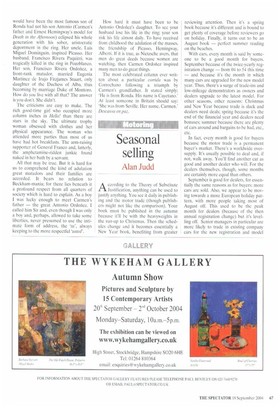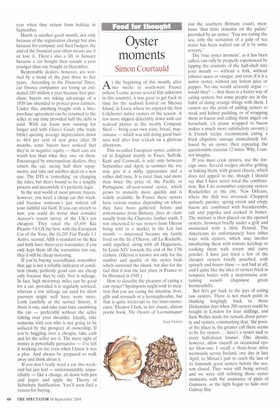Seasonal selling
Alan Judd
According to the Theory of Substitute Justification, anything can be used to justify anything. You see it daily in publishing and the motor trade (though publishers might not like the comparison). Your book must be published in the autumn because it'll be with the heavyweights in the run-up to Christmas. Then the schedules change and it becomes essentially a New Year book, benefiting from greater
reviewing attention. Then it's a spring book because its different and is bound to get plenty of coverage before reviewers go on holiday. Finally, it turns out to be an August book — perfect summer reading on the beaches.
With cars, every month is said by someone to be a good month for buyers. September because of the twice-yearly registration change — from 04 to 54 this time — and because it's the month in which many cars arc upgraded for the new model year. Thus, there's a surge of trade-ins and low-mileage demonstrators as owners and dealers upgrade to the latest model. For other seasons, other reasons: Christmas and New 'Year because trade is slack and dealers need deals; spring because it's the end of the financial year and dealers need bonuses; summer because there are plenty of cars around and bargains to be had, etc., etc.
In fact, every month is good for buyers because the motor trade is a permanent buyer's market. There's a worldwide oversupply. It's usually possible to deal and, if not, walk away. You'll find another car as good and another dealer who will. For the dealers themselves, though, some months are certainly more equal than others.
September is good for dealers, for essentially the same reasons as for buyers: more cars are sold. Also, we appear to be moving towards a more European holiday pattern, with more people taking most of August off. This used to be the peak month for dealers (because of the then annual registration change) but it's levelling off. Senior managers in particular are more likely to trade in existing company cars for the new registration and model year when they return from holiday in September.
March is another good month, not only because of the registration change but also because for company and fleet budgets the end of the financial year often means use it or lose it. There's also a lift in January because a car bought then sounds a year younger than one bought in December.
Responsible dealers, however, are worried by a trend of the past three to five years. According to the Financial Times, car finance companies are losing an estimated £83 million a year because hire-purchase buyers are taking advantage of a 1938 law intended to protect poor farmers. Under this, anything bought with a hirepurchase agreement can be returned to the seller at any time provided half the debt is paid. With car loans now running for longer and with Glass's Guide (the trade bible) quoting average depreciation down to 48.6 per cent of new price after 30 months, some buyers have noticed that they're in negative equity — their cars are worth less than what they owe on them. Encouraged by unscrupulous dealers, they return the car, saving half their repayments, and take out another deal on a new one. The DTI is 'consulting' on changing the rules, but that's bound to be a lengthy process and meanwhile it's perfectly legal.
In the real world of most private buyers, however, you need a cheap car this weekend because someone's just written off your faithful old Golf. If you can stretch to new, you could do worse than consider Autocar's recent survey of the UK's ten cheapest. They rated the £5,495 Kia Picanto 1.0 GS the best, with the European Car of the Year, the £6,295 Fiat Panda 1.1 Active, second. ABS is standard on the Kia and both have three-year warranties; if you only kept them till the warranties run out, they'd still be cheap motoring.
If you're buying secondhand, remember that age is not a reliable indicator of condition (many perfectly good cars are cheap only because they're old). Nor is mileage. In fact, high motorway miles can be good for a car, provided it is regularly serviced, whereas a low mileage car used for short journeys might well have worn more. Look carefully at the service history, if there is one, and take your time examining the car — preferably without the seller talking over your shoulder. Ideally, take someone with you who is not going to be seduced by the prospect of ownership. If you're haggling over a cheapie, take cash and let the seller see it. The mere sight of money is powerfully persuasive — I've felt it working on me even when I knew it was a ploy. And always be prepared to walk away and think about it.
If you don't really need a car this weekend but just feel — understandably, unjustifiably — like a change, sit down with pen and paper and apply the Theory of Substitute Justification. You'll soon find a reason for buying.



















































































 Previous page
Previous page